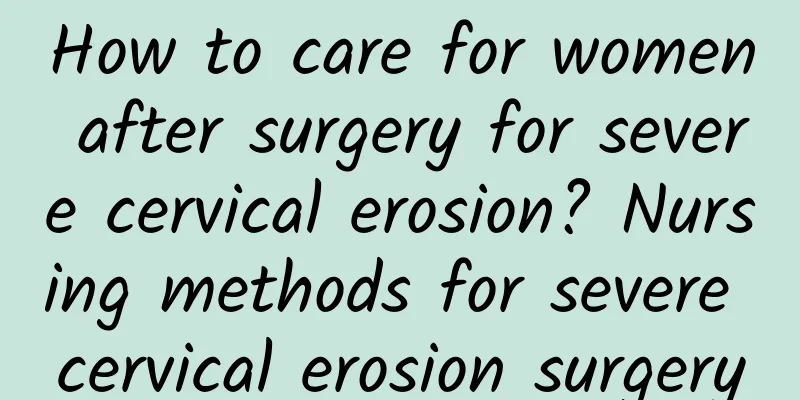What are the daily dietary taboos after abortion? 3 dietary taboos you should pay attention to after abortion

|
After an unexpected pregnancy, women who choose painless abortion should pay special attention to their diet, supplement nutrition and take care of their bodies in time. Next, I will introduce the dietary precautions after painless abortion. I hope all women will pay more attention to it. Female friends should not always think that abortion is just a minor operation. Although the operation is minor, if the care is not done properly, the impact on the future can be great. Therefore, after an abortion, you need to pay attention to hygiene and diet. Let's learn about the dietary principles after an abortion. Avoid foods that strengthen uterine contraction and induce labor: such as oats, cottonseed oil, leeks, mangcai, purslane, kelp, rabbit meat, etc. Oats are smooth and tend to move downward, and have a significant induced labor effect; the stems of purslane, cottonseed oil, and leeks contain certain ingredients that can excite the uterus and increase the contraction of uterine smooth muscle. If consumed by those with threatened abortion, it can easily lead to abortion; kelp and rabbit meat are cold in nature, and eating too much can easily damage the fetal qi and cause fetal movement disorder, so those with threatened abortion should not eat them. Avoid eating raw and cold food before abortion: The spleen and stomach function of women who have abortion is not good. Too cold food will damage the spleen and stomach and affect digestion. Also avoid cold drinks, iced drinks, cold lettuce and other low-temperature foods; avoid eating persimmons, pears, cucumbers, bitter melons, mussels, snails, crabs, turtles and other cold foods. (1) Protein is an important component of antibodies. If it is not taken in enough, the body's resistance will be reduced. Within half a month after artificial abortion, protein should be given at 1.5 to 2 grams per kilogram of body weight, and the daily amount is about 100 to 150 grams. Therefore, you can eat more chicken, lean pork, eggs, milk, beans, bean products, etc. (2) On the basis of a normal diet, fat should be appropriately limited. Within one week after surgery, fat should be controlled at about 80 grams per day. People with menstrual disorders should avoid eating irritating foods, such as chili peppers, wine, vinegar, pepper, ginger, etc. These foods can stimulate congestion of the sexual organs and increase menstrual volume. Cold foods such as crabs, snails, and river clams should also be avoided. (3) After an artificial abortion, the body is weak and prone to sweating. Therefore, water should be replenished in small amounts and multiple times to reduce water evaporation; sweat excretes a large amount of water-soluble vitamins, especially vitamin C, vitamin B1, and vitamin B2. Therefore, you should eat more fresh vegetables and fruits. This is also helpful to prevent constipation. Warm reminder: The above content is the introduction of dietary precautions after painless abortion surgery. I believe everyone has understood it and hope it can be helpful to you. Women must learn more about how to recuperate after surgery to reduce the chance of disease troubles. If you have other questions, you can consult our online experts to give you detailed answers. I wish you good health. |
<<: Do women know what cervical erosion is? 2 small folk remedies for treating cervical erosion
Recommend
The following factors are the causes of uterine fibroids
Many people are confused about the causes of uter...
How should women prevent irregular menstruation?
How should women prevent irregular menstruation? ...
What are the aspects of completely curing bacterial vaginosis?
Women with bacterial vaginosis should pay attenti...
My butt is getting bigger and bigger the more I sit. Is there no hope for it? Do this trick to drive away the big ass
There is a saying on the Internet: "If you s...
How to relieve irregular menstruation?
How to relieve irregular menstruation? Because ma...
How to treat second degree cervical erosion?
How to treat second degree cervical erosion? Seco...
The harm of pelvic inflammatory disease to female fertility
For female friends, pelvic inflammatory disease i...
Learn about the causes of irregular menstruation from the article
For female compatriots, a little carelessness may...
Does female cervical erosion need to be treated? Several precautions for treating cervical erosion
Cervical erosion is the most common type of chron...
How to treat endometrial thickening?
Experts point out that the factors that lead to e...
What are the main symptoms of candidal vaginitis?
What are the symptoms of candidal vaginitis? I be...
What are the nursing measures for uterine fibroids?
Uterine fibroids are a disease that occurs mainly...
Party spit! The Blue and Green parties have their own opinions on the issue of Clenbuterol
The issue of clenbuterol continues to fuel politi...
If women do not pay attention to menstrual hygiene, it may cause adnexitis
If women do not pay attention to menstrual hygien...
What are the specific symptoms of cervical hypertrophy?
Cervical hypertrophy is a gynecological disease. ...









